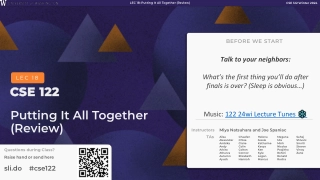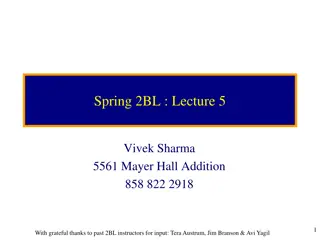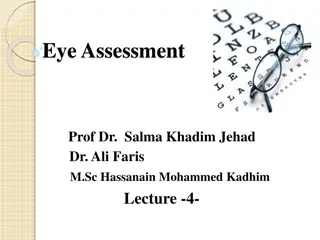
Indefinite Loops in Intro to Programming with Examples
"Explore the concept of indefinite loops in programming through a deceptive problem, flawed solutions, and a fencepost analogy. Learn how to correct the flawed solutions and implement fencepost methods for accurate outputs. Discover a new challenge of modifying a printNumbers method to print prime numbers efficiently. Get insights and practical examples to enhance your programming skills."
Download Presentation

Please find below an Image/Link to download the presentation.
The content on the website is provided AS IS for your information and personal use only. It may not be sold, licensed, or shared on other websites without obtaining consent from the author. If you encounter any issues during the download, it is possible that the publisher has removed the file from their server.
You are allowed to download the files provided on this website for personal or commercial use, subject to the condition that they are used lawfully. All files are the property of their respective owners.
The content on the website is provided AS IS for your information and personal use only. It may not be sold, licensed, or shared on other websites without obtaining consent from the author.
E N D
Presentation Transcript
Indefinite Loops CSCI 161 Introduction to Programming I William Killian
A deceptive problem... Write a method printNumbers that prints each number from 1 to a given maximum, separated by commas. For example, the call: printNumbers(5) should print: 1, 2, 3, 4, 5
Flawed solutions public static void printNumbers(int max) { for (int i = 1; i <= max; i++) { System.out.print(i + ", "); } System.out.println(); // to end the line of output } o Output from printNumbers(5): 1, 2, 3, 4, 5, public static void printNumbers(int max) { for (int i = 1; i <= max; i++) { System.out.print(", " + i); } System.out.println(); // to end the line of output } o Output from printNumbers(5): , 1, 2, 3, 4, 5
Fence post analogy We print n numbers but need only n - 1 commas. Similar to building a fence with wires separated by posts: oIf we use a flawed algorithm that repeatedly places a post + wire, the last post will have an extra dangling wire. for (length of fence) { place a post. place some wire. }
Fencepost loop Add a statement outside the loop to place the initial "post." oAlso called a fencepost loop or a loop-and-a-half solution. place a post. for (length of fence - 1) { place some wire. place a post. }
Fencepost method solution public static void printNumbers(int max) { System.out.print(1); for (int i = 2; i <= max; i++) { System.out.print(", " + i); } System.out.println(); // to end the line } Alternate solution: Either first or last "post" can be taken out: public static void printNumbers(int max) { for (int i = 1; i <= max - 1; i++) { System.out.print(i + ", "); } System.out.println(max); // to end the line }
Fencepost question Modify your method printNumbers into a new method printPrimes that prints all prime numbers up to a max. oExample: printPrimes(50) prints 2, 3, 5, 7, 11, 13, 17, 19, 23, 29, 31, 37, 41, 43, 47 oIf the maximum is less than 2, print no output. To help you, use method countFactors which returns the number of factors of a given integer. o countFactors(20) returns 6 due to factors 1, 2, 4, 5, 10, 20.
Fencepost partial answer // Prints all prime numbers up to the given max. public static void printPrimes(int max) { if (...) { // Fill in System.out.println(); } } // Returns how many factors the given number has. public static int countFactors(int number) { // Fill in }
Categories of loops definite loop: Executes a known number of times. oThe for loops we have seen are definite loops. Print "hello" 10 times. Find all the prime numbers up to an integer n. Print each odd number between 5 and 127. indefinite loop: number of times its body repeats is not known in advance Prompt the user until they type a non-negative number. Print random numbers until a prime number is printed. Repeat until the user types "q" to quit.
The while loop while loop: Repeatedly executes its body as long as a logical test is true. while (test) { statement(s); } Example: int num = 1; // initialization while (num <= 200) { // test System.out.print(num + " "); num *= 2; // update }
Example while loop // finds the first factor of 91, other than 1 int n = 91; int factor = 2; while (n % factor != 0) { factor++; } System.out.println("First factor is " + factor); owhile is better than for because ?
Sentinel values sentinel: A value that signals the end of user input. osentinel loop: Repeats until a sentinel value is seen. Example: Write a program that prompts the user for numbers until the user types 0, then outputs their sum. o(In this case, 0 is the sentinel value.) Enter a number (0 to quit): 10 Enter a number (0 to quit): 20 Enter a number (0 to quit): 30 Enter a number (0 to quit): 0 The sum is 60
Flawed sentinel solution What's wrong with this solution? Scanner console = new Scanner(System.in); int sum = 0; int number = 1; // "dummy value", anything but 0 while (number != 0) { System.out.print("Enter a number (0 to quit): "); number = console.nextInt(); sum += number; } System.out.println("The total is " + sum);
Changing the sentinel value Modify your program to use a sentinel value of -1. oExample log of execution: Enter a number (-1 to quit): 15 Enter a number (-1 to quit): 25 Enter a number (-1 to quit): 10 Enter a number (-1 to quit): 30 Enter a number (-1 to quit): -1 The total is 80
Changing the sentinel value To see the problem, change the sentinel's value to -1: Scanner console = new Scanner(System.in); int sum = 0; int number = 1; // "dummy value", anything but -1 while (number != -1) { System.out.print("Enter a number (-1 to quit): "); number = console.nextInt(); sum = sum + number; } System.out.println("The total is " + sum); Now the solution produces the wrong output. Why? The total was 79
The problem with our code Our code uses a pattern like this: sum = 0. while (input is not the sentinel) { prompt for input; read input. add input to the sum. } On the last pass, the sentinel -1 is added to the sum: prompt for input; read input (-1). add input (-1) to the sum. This is a fencepost problem. oMust read N numbers, but only sum the first N-1 of them.
A fencepost solution sum = 0. prompt for input; read input. // place a "post" while (input is not the sentinel) { add input to the sum. prompt for input; read input. } // place a "wire" // place a "post" Sentinel loops often utilize a fencepost "loop-and-a-half" style solution by pulling some code out of the loop.
Correct sentinel code Scanner console = new Scanner(System.in); int sum = 0; // pull one prompt/read ("post") out of the loop System.out.print("Enter a number (-1 to quit): "); int number = console.nextInt(); while (number != -1) { sum += number; System.out.print("Enter a number (-1 to quit): "); number = console.nextInt(); } // moved to top of loop System.out.println("The total is " + sum);
Sentinel as a constant public static final int SENTINEL = -1; ... Scanner console = new Scanner(System.in); int sum = 0; // pull one prompt/read ("post") out of the loop System.out.print("Enter a number (" + SENTINEL + " to quit): "); int number = console.nextInt(); while (number != SENTINEL) { sum = sum + number; // moved to top of loop System.out.print("Enter a number (" + SENTINEL + " to quit): "); number = console.nextInt(); } System.out.println("The total is " + sum);
do/while Loops Another Type of Indefinite Loop
The do/while loop do/while loop: Performs its test at the end of each repetition. oGuarantees that the loop's {} body will run at least once. do { statement(s); } while (test); // Example: prompt until correct password is typed String phrase; do { System.out.print("Type your password: "); phrase = console.next(); } while (!phrase.equals("abracadabra"));
do/while question Modify the previous Dice program to use do/while. 2 + 4 = 6 3 + 5 = 8 5 + 6 = 11 1 + 1 = 2 4 + 3 = 7 You won after 5 tries! do { // Roll // Sum tries++; } while (sum != 7); Is do/while a good fit for our past Sentinel program?
Methods that are tests Some methods return logical values. oA call to such a method is used as a test in a loop or if. Scanner console = new Scanner(System.in); System.out.print("Type your first name: "); String name = console.next(); if (name.startsWith("Dr.")) { System.out.println("What's up, Doc?"); } else if (name.endsWith("Esq.")) { System.out.println("And I am Ted 'Theodore' Logan!"); }
Type boolean boolean: A logical type whose values are true and false. oA logical test is actually a boolean expression. oIt is legal to create a boolean variable pass a boolean value as a parameter return a boolean value from methods call a method that returns a boolean and use it as a test boolean minor = (age < 21); boolean isProf = name.contains("Prof"); boolean lovesCS = true; // allow who into club? if (minor || isProf || !lovesCS) { System.out.println("Can't enter the club!"); }
Using boolean Why is type boolean useful? oCan capture a complex logical test result and use it later oCan write a method that does a complex test and returns it oMakes code more readable oCan pass around the result of a logical test (as param/return) boolean goodAge = age >= 18 && age < 29; boolean goodHeight = height >= 72 && height < 84; boolean rich = salary >= 1000000.0; if ((goodAge && goodHeight) || rich) { System.out.println("Okay, let's go out!"); } else { System.out.println("It's not you, it's me..."); }
Returning boolean public static boolean isPrime(int n) { int factors = 0; for (int i = 1; i <= n; i++) { if (n % i == 0) { factors++; } } if (factors == 2) { return true; } else { return false; } } Calls to methods returning boolean can be used as tests: if (isPrime(57)) { ... }
Boolean question Write a "rhyme" / "alliterate" program to use boolean methods to test for rhyming and alliteration. Type two words: Bare blare They rhyme! They alliterate!
Boolean answer if (rhyme(word1, word2)) { System.out.println("They rhyme!"); } if (alliterate(word1, word2)) { System.out.println("They alliterate!"); } ... // Returns true if s1 and s2 end with the same two letters. public static boolean rhyme(String s1, String s2) { // ? } // Returns true if s1 and s2 start with the same letter. public static boolean alliterate(String s1, String s2) { if (s1.startsWith(s2.substring(0, 1))) { return true; } else { return false; } }
"Boolean Zen", part 1 Students new to boolean often test if a result is true: if (isPrime(57) == true) { // bad ... } But this is unnecessary and redundant. Preferred: if (isPrime(57)) { // good ... } A similar pattern can be used for a false test: if (isPrime(57) == false) { // bad if (!isPrime(57)) { // good
"Boolean Zen", part 2 Methods that return boolean often have an if/else that returns true or false: public static boolean bothOdd(int n1, int n2) { if (n1 % 2 != 0 && n2 % 2 != 0) { return true; } else { return false; } } oBut the code above is unnecessarily verbose.
Solution w/ boolean var We could store the result of the logical test. public static boolean bothOdd(int n1, int n2) { boolean test = (n1 % 2 != 0 && n2 % 2 != 0); if (test) { // test == true return true; } else { // test == false return false; } } oNotice: Whatever test is, we want to return that.
Solution w/ "Boolean Zen" Observation: The if/else is unnecessary. public static boolean bothOdd(int n1, int n2) { boolean test = (n1 % 2 != 0 && n2 % 2 != 0); return test; } An even shorter version: public static boolean bothOdd(int n1, int n2) { return (n1 % 2 != 0 && n2 % 2 != 0); }
"Boolean Zen" template Replace public static boolean name(parameters) { if (test) { return true; } else { return false; } } with public static boolean name(parameters) { return test; }
Improved isPrime method The following version utilizes Boolean Zen: public static boolean isPrime(int n) { int numFactors = 0; for (int i = 1; i <= n; i++) { if (n % i == 0) { numFactors++; } } // if n has 2 factors -> true ?? } Modify the Rhyme program to use Boolean Zen.
Boolean Zen answer public static void main(String[] args) { Scanner console = new Scanner(System.in); System.out.print("Type two words: "); String word1 = console.next().toLowerCase(); String word2 = console.next().toLowerCase(); if (rhyme(word1, word2)) { System.out.println("They rhyme!"); } if (alliterate(word1, word2)) { System.out.println("They alliterate!"); } } // Returns true if s1 and s2 end with the same two letters. public static boolean rhyme(String s1, String s2) { return s2.length() >= 2 && ?? } // Returns true if s1 and s2 start with the same letter. public static boolean alliterate(String s1, String s2) { return s1.startsWith(s2.substring(0, 1)); }
"Short-circuit" evaluation Java stops evaluating a test if it knows the answer. o&& stops early if any part of the test is false o|| stops early if any part of the test is true The following test will crash if s2's length is less than 2: // Returns true if s1 and s2 end with the same two letters. public static boolean rhyme(String s1, String s2) { return s1.endsWith(s2.substring(s2.length() - 2)) && s1.length() >= 2 && s2.length() >= 2; } The following test will not crash; it stops if length < 2: // Returns true if s1 and s2 end with the same two letters. public static boolean rhyme(String s1, String s2) { return s1.length() >= 2 && s2.length() >= 2 && s1.endsWith(s2.substring(s2.length() - 2)); }
De Morgan's Law De Morgan's Law: Rules used to negate boolean tests. Original Expression a && b a || b Negated Expression !a || !b !a && !b Alternative !(a && b) !(a || b) oExample: Original Code Negated Code if (x == 7 && y > 3) { ... } if (x != 7 || y <= 3) { ... }
Boolean practice questions Write a method named isVowel that returns whether a String is a vowel (a, e, i, o, or u), case-insensitively. oisVowel("q") returns false oisVowel("A") returns true oisVowel("e") returns true Change the above method into an isNonVowel that returns whether a String is any character except a vowel. oisNonVowel("q") returns true oisNonVowel("A") returns false oisNonVowel("e") returns false
Boolean practice answers // Enlightened version. I have seen the true way (and false way) public static boolean isVowel(String s) { return ? } // Enlightened "Boolean Zen" version public static boolean isNonVowel(String s) { return !s.equalsIgnoreCase("a") && !s.equalsIgnoreCase("e") && !s.equalsIgnoreCase("i") && !s.equalsIgnoreCase("o") && !s.equalsIgnoreCase("u"); // or ? }
When to return? Methods with loops and return values can be tricky. oWhen and where should the method return its result? Write a method pickSeven that accepts a Random parameter and uses it to draw up to ten lotto numbers from 1-30. oIf any of the numbers is a lucky 7, the method should stop and return true. If none of the ten are 7 it should return false. oThe method should print each number as it is drawn. 15 29 18 29 11 3 30 17 19 22 (first call) 29 5 29 4 7 (second call)
Solution // Draws 10 lotto numbers; returns true if one is 7. public static boolean pickSeven(Random rand) { ?? }
while loop question Write a method sumDigits that accepts an integer parameter and returns the sum of its digits. oAssume that the number is non-negative. oExample: sumDigits(29107) returns 2+9+1+0+7 or 19 oHint: Use the % operator to extract a digit from a number.
while loop answer public static int sumDigits(int n) { // Handle negatives n = Math.abs(n); ?? }
Boolean return questions hasAnOddDigit : returns true if any digit of an integer is odd. ohasAnOddDigit(4822116) returns true ohasAnOddDigit(2448) returns false allDigitsOdd : returns true if every digit of an integer is odd. oallDigitsOdd(135319) returns true oallDigitsOdd(9174529) returns false isAllVowels : returns true if every char in a String is a vowel. oisAllVowels("eIeIo") returns true oisAllVowels("oink") returns false
Boolean return answers public static boolean hasAnOddDigit(int n) { while (n != 0) { // Check whether last digit is odd if (n % 2 != 0) { return true; } n = n / 10; } return false; } public static boolean allDigitsOdd(int n) { Exercise } public static boolean isAllVowels(String s) { Exercise }






















